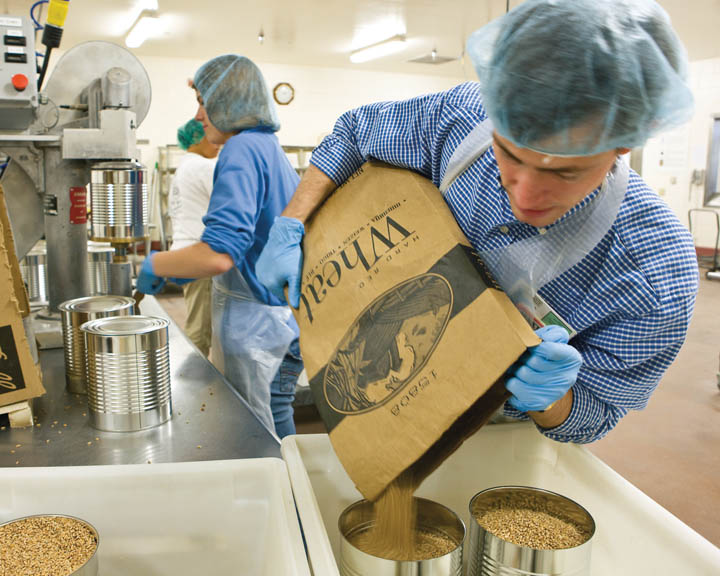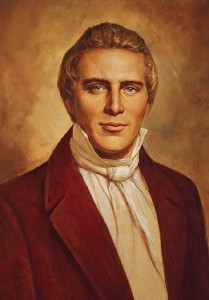This Saturday I received training for a new volunteer position in my church. As a member of The Church of Jesus Christ of Latter-day Saints, known as the Mormons, I now have the responsibility to help members of my congregation to find jobs, to find better jobs, to get job training, or to start home businesses or become self-employed. This calling is sometimes known as the Employment Consultant.
As I attended the training meeting (much of what I was taught can be found at the Church’s web-page Provident Living), one word was repeated over and over again: self-reliance.
Bruce R. McConkie, a leader and theologian in the Church, defined self-reliance this way:
“Properly understood and practiced, self-reliance is a desirable saintly virtue … The saints [members of the Church], for instance, should have confidence in their own abilities, efforts, and judgments to make a living, to increase in faith and the attributes of godliness, to work out their salvation, to pass all the tests of this mortal probation.”
“They should know that the Lord has not placed his children in positions beyond their capacities to cope with, that the normal trials and tribulations of life are part of the eternal system. Ordinarily members of the Church should make their own personal decisions, using the agency [free will] the Almighty has given them, without running to their bishops (the leaders of the local congregation) or others for direction.” (Mormon Doctrine, 701)
Self-reliance covers every aspect of Church and the gospel; however, my focus is on employment and provident living.
JOSEPH SMITH AND SELF-RELIANCE
The Church’s emphasis on self-reliance goes back to its beginnings. Joseph Smith, the founding prophet of the Church, grew up in a poor family. He was candid about his family’s situation, but was clear that it was not due to laziness:
“Being in indigent circumstances, [we] were obliged to labor hard for the support of a large family, having nine children. And … it required the exertions of all that were able to render any assistance for the support of the family.” (1832 History. Standardized.)
In an interview with Joseph’s younger brother William, we learn more about their family’s circumstances:
“Well,” said Brother Briggs, “It is said that Joseph and the rest of the family were lazy and indolent.”
“[William Smith replied] We never heard of such a thing until after Joseph told his vision, and not then by our friends. Whenever the neighbors wanted a good day’s work done they knew where they could get a good hand and they were not particular to take any of the other boys before Joseph either.”
“We cleared sixty acres of the heaviest timber I ever saw. We had a good place. We also had on it from twelve to fifteen hundred sugar trees, and to gather the sap and make sugar and molasses from that number of trees was no lazy job. We worked hard to clear our place and the neighbors were a little jealous.”
“If you will figure up how much work it would take to clear sixty acres of heavy timber land, heavier than any here, trees you could not conveniently cut down, you can tell whether we were lazy or not, and Joseph did his share of the work with the rest of the boys.” (William Smith, “Another Testimony,” Deseret Evening News, 20 January 1891)
They were sturdy pioneer stock. The Smith family knew the importance of work. So it is not surprising that Joseph Smith taught the following:
“Let the Saints remember that great things depend on their individual exertion.” (Chapter 23: “How Good and How Pleasant It Is … to Dwell Together in Unity”, Teachings of Presidents of the Church: Joseph Smith, [2007], 271–80)
HELPING HANDS
Of course, at times people are in need of help. That is why Joseph Smith also taught:
“Let us realize that we are not to live to ourselves, but to God; by so doing the greatest blessings will rest upon us both in time and in eternity.”
“The greatest temporal [physical] and spiritual blessings which always flow from faithfulness and concerted effort, never attended individual exertion or enterprise. The history of all past ages abundantly attests this fact.” (ibid.)
That is the delicate balance. Sometimes we need to be self-reliant, and sometimes we honestly need a helping hand. That, in part, was what my training was about. I have to help people without smothering them.
A CASE STUDY
A few years ago I was visiting a friend of mine. As we talked, she opened up and mentioned that she was in-between jobs—and she really was: she had quit her previous job and would be starting her new job in a week—and was out of food. I told her that the Church had resources available for her. She should not feel guilty because she was working, and had honestly hit a snag. Later, she visited with our bishop and he took care of her immediate needs.
This is an ideal case. Not only was she self-reliant, she was improving her work situation. But she was just a victim of circumstance and Murphy’s Law. And The Church of Jesus Christ was there for her when she had a legitimate need.
Self-reliance. Self-reliance. Self-reliance. All of my training could be summed up in that one compound word.
CONSTRUCTIVE HELP
As these principles of work and self-reliance were being taught, I thought about the words of Henry David Thoreau, who was, coincidentally, a contemporary of Joseph Smith:
“Be sure that you give the poor the aid they most need … If you give money, spend yourself with it, and do not merely abandon it to them. … ”
“There are a thousand hacking at the branches of evil to one who is striking at the root, and it may be that he who bestows the largest amount of time and money on the needy is doing the most by his mode of life to produce that misery which he strives in vain to relieve. … ” (Walden, Ch. 1)
That is a good guide: am I being constructive in my help? Are people becoming self-reliant, and therefore stronger? Or am I aggravating a problem with short-term band-aid solutions? My charge is to help people with long-term solutions. I do this by encouraging self-reliance.
CONCLUSION
That is what makes the Church of Jesus Christ so great—we want people to become better and stronger. I am excited for this calling, and for the chance to help people to better themselves financially. This is one of the practical—and financial—fruits of Joseph Smith.




Thank you for writing this piece. You gave wonderful insight on “the way of life” that Adam, Jesus and Joseph all stood for. A way of life that is, unfortunately, historically diluted over generations, finally forgotten, and eventually realized during a day of reckoning. Every worthy priesthood holder who is capable, being assisted by his wife and children, should have a garden and learn the skills to produce and preserve for their “own” needs, becoming “truly” self-reliant. A garden is just the starting point to the greater living that accompanies working with the earth (handy craft, wood work, weaving, masonry, health, and more, all promoted in the Doctrine and Covenants). The further a society disconnects from the Earth, the further they disconnect from the Creator of it. Ezra Taft Benson summed it up well in his 1980 talk “Prepare for the Days of Tribulation”
https://www.lds.org/general-conference/1980/10/prepare-for-the-days-of-tribulation?lang=eng
By the way, when you mentioned Thoreau and Joseph together, you gained my interest greatly 😉